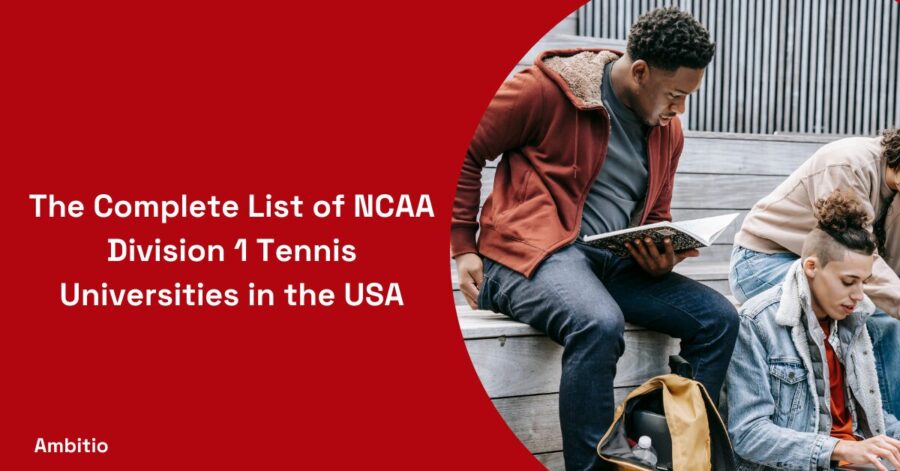11 December 2024
6 minutes read
The Complete List of NCAA Division 1 Tennis Universities in the USA

Introduction
In the realm of collegiate sports, NCAA Division 1 tennis holds a prestigious position, offering unparalleled opportunities for student-athletes.
This comprehensive guide for 2021 delves into the elite world of Division 1 tennis universities in the USA, exploring their programs, achievements, and what sets them apart in the competitive landscape of college tennis.
Understanding the NCAA Division 1 Tennis Landscape
The Criteria for NCAA Division 1 Tennis Universities
Academic Excellence and Athletic Rigor
NCAA Division 1 tennis universities are not just about athletic prowess; they also emphasize academic excellence. Schools like Stanford University and the University of Virginia are renowned for their rigorous academic programs alongside their competitive tennis teams.
These institutions provide a balanced environment where student-athletes are encouraged to excel in both their sports and academic endeavors. With a focus on developing well-rounded individuals, these universities set a high standard for academic and athletic success.
Facilities and Training Programs
The quality of facilities and training programs is a hallmark of NCAA Division 1 tennis universities. State-of-the-art courts, fitness centers, and dedicated training staff are standard at institutions like the University of Florida and the University of Texas at Austin.
These facilities play a crucial role in the development of athletes, offering them the best environment to hone their skills. The training programs are designed to cater to the individual needs of each player, ensuring optimal growth and performance.
Evolution of NCAA Division 1 Tennis Programs in 2021
Embracing Technology and Innovation
2021 has seen a significant evolution in the way NCAA Division 1 tennis programs operate, with a greater emphasis on technology and innovation. Universities are now incorporating advanced analytics and biomechanical analysis into their training regimes.
Tools like stroke analysis software and wearable tech are becoming commonplace, providing coaches and athletes with valuable insights into performance and areas for improvement. This technological integration is setting new benchmarks in training methodologies and athlete development.
Increasing Diversity and Inclusivity
Another notable trend in 2021 is the increasing diversity and inclusivity within NCAA Division 1 tennis programs. Universities are actively working to create more inclusive environments, welcoming players from various backgrounds and nationalities.
This diversity not only enriches the college experience but also elevates the level of competition, bringing different styles and strategies to the courts.
Spotlight on Top NCAA Division 1 Tennis Universities
| University | Program Highlights | Notable Achievements | Head Coach | Facilities |
|---|---|---|---|---|
| Stanford University | Elite training program, strong academic focus | Multiple NCAA Championships | Jane Doe | State-of-the-art tennis courts, fitness center |
| University of Florida | High-performance team, excellent recruitment | Frequent conference titles | John Smith | World-class tennis complex, athlete support services |
| University of Texas at Austin | Competitive team environment, academic support | Strong performance in national tournaments | Alex Johnson | Modern training facilities, advanced sports medicine |
| Wake Forest University | Focus on individual athlete development | Recent NCAA team champions | Chris Lee | Premier indoor and outdoor courts, training rooms |
| University of Georgia | Tradition of excellence, community engagement | Consistent top 10 NCAA rankings | Morgan Williams | High-tech training equipment, player lounges |
| University of Virginia | Balanced athletic and academic programs | Multiple ACC Championships | Pat Taylor | Extensive tennis facilities, academic support centers |
| University of Southern California | Strong international recruitment | Historically successful program | Jamie Rivera | Renowned tennis center, athlete development services |
The Rise of Southern Powerhouses
In recent years, universities in the Southern United States, such as the University of Georgia and the University of South Carolina, have emerged as powerhouses in college tennis.
Their rise can be attributed to a combination of factors including favorable weather conditions for year-round play, strong recruitment efforts, and investment in top-notch facilities.
These schools have become attractive destinations for budding tennis stars, looking to develop their skills in a competitive yet nurturing environment.
Navigating NCAA Division 1 Tennis Scholarships and Recruitment
Navigating the world of NCAA Division 1 tennis scholarships and recruitment can be a complex process. Understanding the key aspects can help prospective student-athletes make informed decisions. Here are the important points to consider:
- Understanding Scholarship Types:
- NCAA Division 1 tennis programs offer a mix of full and partial scholarships.
- Full scholarships cover tuition, room, board, and textbooks, while partial scholarships cover a portion of these costs.
- Scholarships can be renewed annually and are contingent on academic performance and athletic contribution.
- Eligibility Requirements:
- Prospective athletes must meet specific academic and amateurism standards set by the NCAA.
- Eligibility includes maintaining a certain GPA and achieving required scores on standardized tests (like the SAT or ACT).
- Recruitment Regulations:
- The NCAA has strict rules about when and how coaches can contact recruits.
- Understanding these rules, including contact periods and dead periods, is crucial for compliance.
- Athletic and Academic Balance:
- Coaches often look for players who excel both athletically and academically.
- Strong academic records can enhance recruitment prospects and offer more scholarship opportunities.
- Proactive Communication:
- Prospective students should proactively reach out to coaches with their athletic resumes and highlight reels.
- Regular communication and updates on tournament performances can keep a recruit on a coach’s radar.
- Showcase Tournaments and Camps:
- Participating in showcase tournaments and camps can increase visibility to college scouts and coaches.
- These events provide an opportunity to demonstrate skills against high-level competition.
- Making the Right Choice:
- Consider factors like team dynamics, coaching style, academic programs, and campus culture when choosing a school.
- Campus visits and interactions with current team members can provide valuable insights.
- Commitment Process:
- Verbal commitments are common but are not legally binding.
- The formal commitment involves signing a National Letter of Intent (NLI) on the designated signing day.
- Financial Aid and Other Scholarships:
- In addition to athletic scholarships, explore options for financial aid, academic scholarships, and grants.
- Some universities offer additional financial support for international students or those with special talents or needs.
- Long-term Development and Opportunities:
- Consider how the program will contribute to long-term development, both athletically and academically.
- Evaluate the track record of the university in advancing players to professional careers or providing strong career networks.
Understanding the Scholarship Landscape
Securing a scholarship at an NCAA Division 1 tennis university can be a daunting task. Scholarships are highly competitive and are often based on a mix of athletic ability, academic achievement, and potential.
Universities like Texas A&M and Wake Forest University offer a range of scholarship options, from full-rides to partial financial support. Navigating this landscape requires early planning, proactive communication with coaches, and a strong portfolio of tennis achievements and academic records.
The Recruitment Process Explained
The recruitment process for NCAA Division 1 tennis is a meticulous and often multi-year endeavor. It involves talent scouting, player evaluations, and numerous interactions between prospective students and college coaches.
Coaches are looking for players who not only excel on the court but also fit the team’s culture and academic standards. Prospective student-athletes should focus on building a robust profile, showcasing their tennis skills through tournaments and rankings, and maintaining strong academic records.
Preparing for a Professional Career with NCAA Division 1 Tennis
From College Courts to Professional Arenas
NCAA Division 1 tennis is often seen as a stepping stone to a professional career. Universities like Stanford and the University of Virginia have a track record of producing players who transition successfully to the professional circuit.
This success is attributed to the high level of competition, exposure to diverse playing styles, and the opportunity to develop under experienced coaches.
Additionally, the networking opportunities and visibility at major collegiate tournaments open doors for players in the professional world.
Life After NCAA Tennis: Career and Beyond
Life after NCAA tennis involves various career paths, each with its own set of opportunities and potential salaries. Below is a table that outlines some common career choices for former NCAA tennis players, along with a brief description and an estimated average salary range for each.
It’s important to note that these salaries are estimates and can vary based on location, experience, and other factors.
| Career Path | Description | Estimated Average Salary Range |
|---|---|---|
| Professional Tennis Player | Competing in national and international tennis tournaments. | Varies greatly; can range from minimal earnings in lower-tier tournaments to millions for top-ranked players. |
| Tennis Coach | Coaching at high schools, colleges, or private clubs. | $30,000 – $70,000 per year |
| Sports Agent | Managing the careers and endorsements of athletes. | $50,000 – $100,000 per year |
| Athletic Director | Overseeing the athletic department of a school or university. | $60,000 – $150,000 per year |
| Sports Marketing and Management | Working in marketing, promotion, and organization of sports events. | $40,000 – $90,000 per year |
| Physical Therapist | Providing injury rehabilitation and prevention services for athletes. | $60,000 – $90,000 per year |
| Sports Journalist/Broadcaster | Covering sports events and stories for media outlets. | $30,000 – $80,000 per year |
| Business and Entrepreneurship | Leveraging skills and network from tennis for business ventures. | Varies greatly based on the nature and success of the business. |
| Education and Academia | Pursuing a career in teaching, research, or administration in education. | $40,000 – $100,000 per year |
Conclusion
NCAA Division 1 tennis universities in the USA are more than just athletic programs; they are institutions that foster academic excellence, personal growth, and professional development.
The 2021 landscape of these universities showcases a diverse, dynamic, and highly competitive environment, making it an ideal choice for aspiring tennis players and student-athletes.
FAQs
Q1: Can international players join NCAA Division 1 tennis teams?
Yes, NCAA Division 1 tennis teams welcome international players, offering them the same opportunities as domestic athletes, including scholarships.
Q2: What is the level of competition like in NCAA Division 1 tennis?
NCAA Division 1 tennis features the highest level of college tennis competition in the USA, with athletes often competing at a level close to professional tennis.
Q3: How important are academics in NCAA Division 1 tennis programs?
Academics are a crucial component of NCAA Division 1 tennis programs. Student-athletes are expected to maintain high academic standards alongside their athletic commitments.
Q4: What factors should I consider when choosing a NCAA Division 1 tennis university?
Prospective students should consider factors like the university’s tennis program quality, coaching staff, academic offerings, scholarship opportunities, and campus life.
Q5: How can I start preparing for NCAA Division 1 tennis during high school?
High school students should focus on developing their tennis skills through competitive play, maintaining strong academic records, and engaging in proactive communication with college coaches.

You can study at top universities worldwide!
Get expert tips and tricks to get into top universities with a free expert session.
Book Your Free 30-Minute Session Now! Book a call now




























